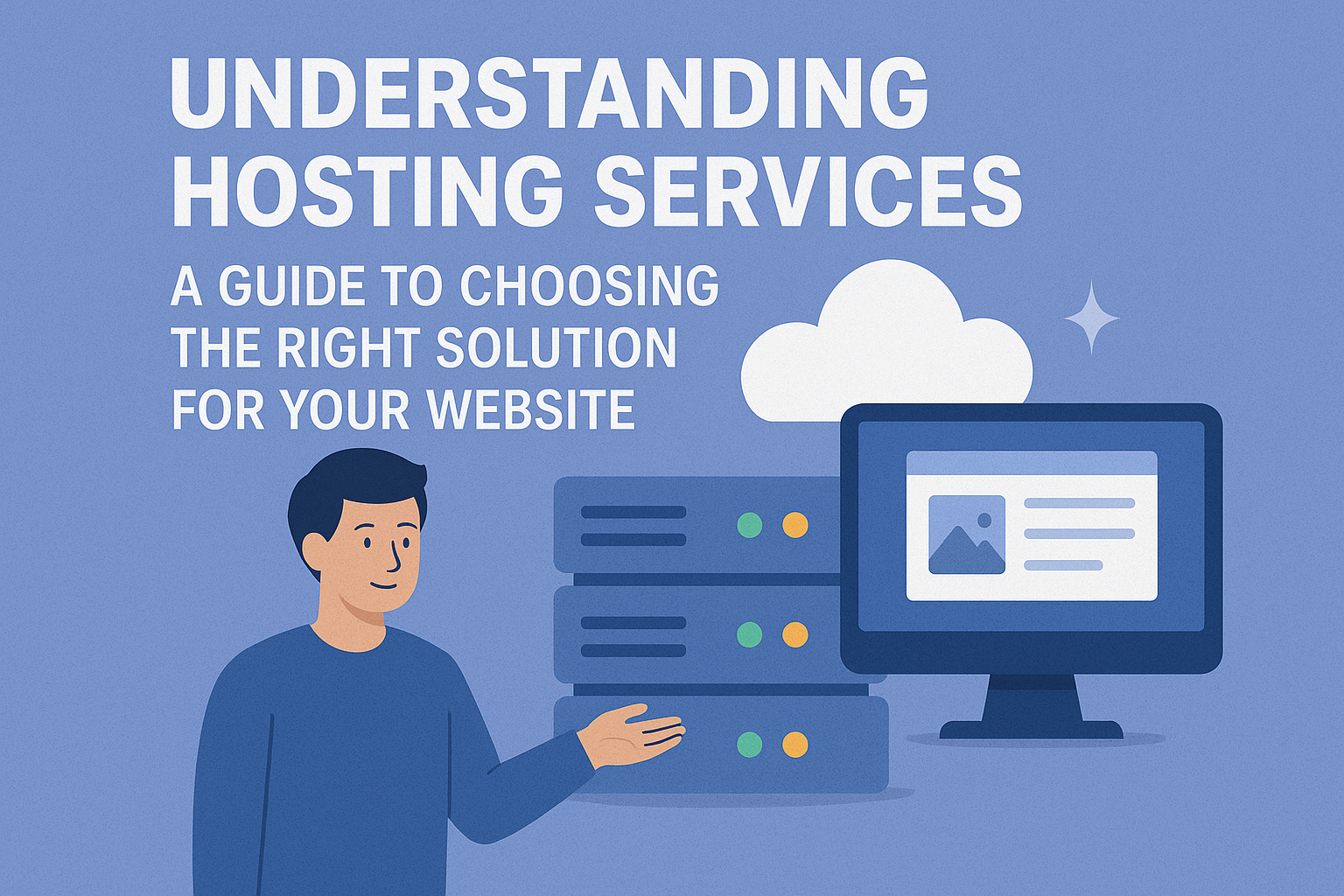Understanding Hosting Services: A Guide to Choosing the Right Solution for Your Website

Did you know that over 1.7 billion websites are hosted online? That’s a staggering number, and it highlights just how critical hosting services are in today’s digital landscape. Whether you’re a blogger, a small business owner, or part of a large corporation, selecting the right hosting service is essential for establishing and maintaining your online presence. In this blog post, we’ll explore the world of hosting services, breaking down the different types and helping you determine which one is the best fit for your website.
What Are Hosting Services?
Hosting services are companies that provide the technology and infrastructure needed to store your website’s files and make them accessible on the internet. Essentially, they rent out space on a server where your website lives, ensuring it’s available to users 24/7. But not all hosting services are created equal—there are several types, each suited to different needs, budgets, and levels of technical expertise. Let’s dive into the four main types: shared hosting, VPS hosting, dedicated hosting, and cloud hosting.
Types of Hosting Services
When it comes to establishing a website, understanding the different types of hosting services is essential. Hosting services provide the infrastructure and technology needed to store your website’s files and make them accessible on the internet. There are four primary types of hosting services: shared hosting, VPS hosting, dedicated hosting, and cloud hosting. Each type offers unique features, benefits, and drawbacks, making them suitable for different needs. Below, we’ll explore each one in detail.
1. Shared Hosting
Shared hosting is the most basic and budget-friendly option. With this type of hosting, your website shares a server with multiple other websites. This means the server’s resources—such as CPU, RAM, and storage—are divided among all the sites on that server.
Pros:
- Affordable: Shared hosting is the cheapest option, making it ideal for small websites, personal blogs, or startups.
- Easy to Use: Providers often include user-friendly control panels and one-click installations for popular platforms like WordPress.
Cons:
- Limited Resources: Since resources are shared, your site’s performance can suffer if other websites on the server experience high traffic.
- Less Control: You have minimal control over server settings and configurations.
Best For: Beginners, small websites, or those with low to moderate traffic.
2. VPS Hosting
VPS (Virtual Private Server) hosting offers a step up from shared hosting. Your website is still on a physical server with others, but it’s allocated its virtual partition, meaning you get dedicated resources and more control.
Pros:
- More Resources: VPS provides dedicated CPU, RAM, and storage, ensuring better performance.
- Better Performance: Your site’s speed and reliability aren’t impacted by other websites.
- More Control: You get root access, allowing for custom configurations.
Cons:
- More Expensive: VPS hosting costs more than shared hosting.
- Requires Technical Knowledge: Managing a VPS can be complex for those without server management experience.
Best For: Growing websites, e-commerce stores, or businesses needing more power and flexibility.
3. Dedicated Hosting
Dedicated hosting gives you an entire physical server for your website alone. This means you have all the server’s resources at your disposal, along with complete control over its setup.
Pros:
Maximum Resources: Full access to the server’s CPU, RAM, and storage ensures top-tier performance.
Full Control: You can fully customize the server to meet your specific needs.
High Performance: Ideal for websites with heavy traffic or resource-intensive applications.
Cons:
Expensive: Dedicated hosting is the priciest option.
Requires Advanced Technical Knowledge: Managing a dedicated server demands a high level of expertise.
Best For: Large businesses, high-traffic websites, or enterprises with specific security and performance requirements.
4. Cloud Hosting
Cloud hosting is a modern, scalable solution that uses a network of servers to host your website. Instead of relying on a single physical server, your site is distributed across multiple servers, ensuring flexibility and reliability.
Pros:
Scalable: Easily handles traffic spikes by scaling resources up or down as needed.
Reliable: Since your site is hosted across multiple servers, downtime is minimized.
Flexible: Pay only for the resources you use, making it cost-effective for varying traffic levels.
Cons:
Can Be Expensive: For high-traffic sites, costs can add up quickly.
Requires Technical Knowledge: Managing a cloud environment can be complex.
Best For: Websites with unpredictable traffic, growing businesses, or those needing high availability.
Popular Hosting Providers
Choosing a hosting provider is just as important as selecting the type of hosting. Here are a few well-known options to consider:
- Bluehost: A top choice for shared hosting, Bluehost is known for its affordability and beginner-friendly features, including one-click WordPress installations.
- HostGator: Offering a wide range of hosting options—from shared to dedicated—HostGator is a versatile provider with strong customer support.
- SiteGround: Renowned for its high-performance shared hosting and excellent customer service, SiteGround is a favorite among small to medium-sized websites.
Each provider has its strengths, so it’s worth researching which one aligns best with your needs.
How to Choose the Right Hosting Service
Selecting the right hosting service depends on several factors:
- Budget: Shared hosting is the most affordable, while dedicated and cloud hosting are more expensive.
- Website Traffic: Low-traffic sites can thrive on shared hosting, but high-traffic sites may need VPS, dedicated, or cloud solutions.
- Technical Expertise: If you’re not tech-savvy, shared or managed hosting options are easier to handle.
- Scalability: If your website is growing or experiences fluctuating traffic, cloud hosting offers the flexibility to scale.
Take the time to assess your current needs and future goals. If you’re just starting, shared hosting might be sufficient. As your site grows, you can always upgrade to VPS or dedicated hosting. For those who need reliability and scalability from the start, cloud hosting is an excellent choice.
Conclusion
Now that you understand the different types of hosting services, it’s time to make an informed decision. Whether you opt for the affordability of shared hosting, the power of VPS or dedicated hosting, or the flexibility of cloud hosting, the key is to choose a solution that aligns with your website’s needs and your long-term goals.
Remember, your hosting service is the foundation of your online presence. Take your time, do your research, and don’t hesitate to reach out to providers for more information. The right choice will set your website up for success.













